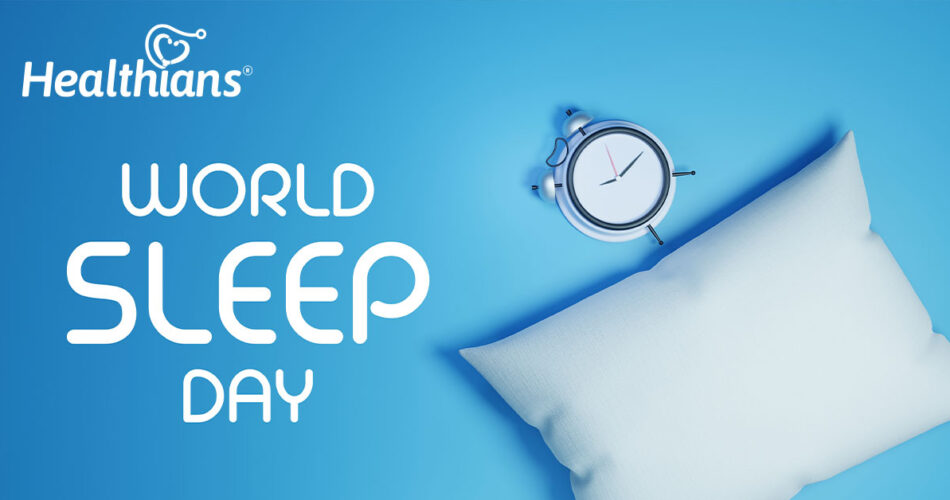Introduction
Every year World Sleep Day is observed on March 17 to raise awareness about the importance of sleep for our health and well-being.
Did you know according to a survey it was recorded that approximately 55% of Indian adults face trouble sleeping at least 3 nights a week? That’s a disturbing number. It seems that sleeping is the easiest thing to do, but who knew that at some point in life, it would be the most difficult daily task to do?
This year’s theme for World Sleep Day is ‘Sleep is Essential for Health’. It emphasises the importance of sleep for maintaining good health.
On average, a human requires about six to eight hours of sound sleep, but due to our sedentary lifestyle, dietary choices or poor diet habits, we fail to achieve that sound sleep. Hence, people suffer from lack of sleep, insomnia, sleep deprivation, sleep apnea and more.
World Sleep Day aims to educate people about the need for quality sleep and how they can have a healthy sleep cycle. In this blog, we will put light on various aspects related to sleep such as how our lifestyle choices can improve the quality of sleep. Also, we will brief you about some dangerous health issues that can arise because of a regular poor sleep routine.
World Sleep Day: Most common dietary and lifestyle habits that lead to sleep disorders:
Caffeine intake
Caffeine is addictive and most of us are habitual of having it at any time of the day. But you’ll be surprised to know that regular caffeine consumption can affect your sleep quality and routine.
Caffeine is a stimulant that can increase alertness and energy levels. However, its effects can last for several hours and may disrupt the normal sleep cycle. Caffeine works by blocking the action of a neurotransmitter called adenosine, which is responsible for promoting sleepiness and regulating sleep-wake cycles.
By interfering with adenosine, caffeine can delay the onset of sleep, reduce total sleep time, and increase the amount of time spent in light sleep stages. Additionally, caffeine can also increase the frequency of awakenings during the night and cause sleep disturbances. Therefore, consuming caffeine, especially in large quantities or close to bedtime, can negatively impact the quality and duration of sleep.
Poor lifestyle
Lifestyle and sleep are closely related because our daily habits and behaviours can have a significant impact on the quality and quantity of sleep we get. Factors such as diet, exercise, stress levels, and screen time can all affect our ability to fall asleep, stay asleep, and wake up feeling rested. Eating a healthy diet, engaging in regular physical activity, managing stress, and limiting screen time before bed can all promote better sleep. On the other hand, unhealthy lifestyle choices such as a sedentary lifestyle, a poor diet, excessive alcohol or caffeine consumption, and irregular sleep schedules can all negatively impact sleep quality and lead to sleep problems over time.
Lack of exercise
Exercise and sleep are two important aspects of a healthy lifestyle. Regular exercise can improve the quality and duration of sleep, while adequate sleep is essential for optimal exercise performance and recovery.
Exercise has been shown to improve sleep quality by reducing the time it takes to fall asleep, increasing the amount of time spent in deep sleep, and decreasing the number of times a person wakes up during the night. This is thought to be due to the effect of exercise on the body’s stress response system and its ability to reduce anxiety and depression.
To improve sleep quality, exercise can also help regulate the body’s circadian rhythm, which is the internal clock that controls when we feel sleepy or awake. Regular exercise at the same time each day can help reinforce this rhythm and improve the consistency of sleep patterns.
The food you eat
The food you eat can have a significant impact on your sleep quality. Certain foods can help promote sleep, such as those rich in tryptophan, magnesium, and melatonin. These nutrients help relax the body and regulate sleep-wake cycles. On the other hand, foods that contain caffeine or alcohol can disrupt sleep, causing difficulty falling or staying asleep. Therefore, it is important to maintain a balanced and healthy diet and avoid consuming stimulating foods and drinks before bedtime. By doing so, you can improve your sleep quality and overall health.
Stress
When we experience stress, our body produces cortisol, a hormone that can disrupt our sleep-wake cycle. Cortisol can keep us awake at night, making it difficult to fall asleep or stay asleep. Additionally, stress can cause our mind to race, making it hard to relax and fall asleep.
Lack of sleep can also contribute to increased stress levels, as we may feel irritable, anxious, or overwhelmed. This can create a cycle of stress and sleep disruption that can be challenging to break. Therefore, managing stress through relaxation techniques and maintaining healthy sleep habits is essential for overall well-being.
Final thoughts
As today is World Sleep Day 2023, it’s important to recognize the significance of a good night’s sleep for our health and well-being. If you struggle with your sleep, there are various ways to take charge of your sleep cycle, including sticking to a consistent sleep schedule, creating a relaxing sleep environment, practising good sleep hygiene, and seeking professional help if necessary. By prioritizing quality sleep, you can improve your physical, mental, and emotional health and feel more energized and productive throughout the day.
Furthermore, if you are facing sleep-related issues you may get yourself a sleep study test and get in touch with a health expert who can guide you to get rid of sleepless nights.




